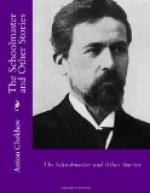Towards evening Andrey Andreitch arrived and as usual played the fiddle for a long time. He was not given to much talk as a rule, and was fond of the fiddle, perhaps because one could be silent while playing. At eleven o’clock when he was about to go home and had put on his greatcoat, he embraced Nadya and began greedily kissing her face, her shoulders, and her hands.
“My dear, my sweet, my charmer,” he muttered. “Oh how happy I am! I am beside myself with rapture!”
And it seemed to her as though she had heard that long, long ago, or had read it somewhere . . . in some old tattered novel thrown away long ago. In the dining-room Sasha was sitting at the table drinking tea with the saucer poised on his five long fingers; Granny was laying out patience; Nina Ivanovna was reading. The flame crackled in the ikon lamp and everything, it seemed, was quiet and going well. Nadya said good-night, went upstairs to her room, got into bed and fell asleep at once. But just as on the night before, almost before it was light, she woke up. She was not sleepy, there was an uneasy, oppressive feeling in her heart. She sat up with her head on her knees and thought of her fiance and her marriage. . . . She for some reason remembered that her mother had not loved her father and now had nothing and lived in complete dependence on her mother-in-law, Granny. And however much Nadya pondered she could not imagine why she had hitherto seen in her mother something special and exceptional, how it was she had not noticed that she was a simple, ordinary, unhappy woman.
And Sasha downstairs was not asleep, she could hear him coughing. He is a queer, naive man, thought Nadya, and in all his dreams, in all those marvellous gardens and wonderful fountains one felt there was something absurd. But for some reason in his naivete, in this very absurdity there was something so beautiful that as soon as she thought of the possibility of going to the university, it sent a cold thrill through her heart and her bosom and flooded them with joy and rapture.
“But better not think, better not think . . .” she whispered. “I must not think of it.”
“Tick-tock,” tapped the watchman somewhere far away. “Tick-tock . . . tick-tock. . . .”
III
In the middle of June Sasha suddenly felt bored and made up his mind to return to Moscow.
“I can’t exist in this town,” he said gloomily. “No water supply, no drains! It disgusts me to eat at dinner; the filth in the kitchen is incredible. . . .”
“Wait a little, prodigal son!” Granny tried to persuade him, speaking for some reason in a whisper, “the wedding is to be on the seventh.”
“I don’t want to.”
“You meant to stay with us until September!”
“But now, you see, I don’t want to. I must get to work.”




